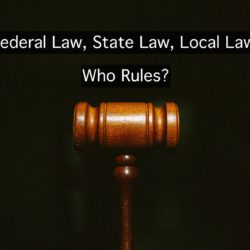This information is provided for educational purposes only. Reader retains full responsibility for the use of the information contained herein.
Employers often find that federal regulations, state laws, and local ordinances are at odds with each other, and are faced with the question of which is more important – federal, state, or local? The answer is not as simple as one might think. Local, state, and federal governments are run by different elected officials, often with contrasting views and priorities. When safety, privacy, drug use, and medical treatment intersect, the matter can quickly become complex.
Preemption and the Supremacy Clause
The Supremacy Clause of the United States Constitution establishes that state laws are subordinate to federal laws and regulations. Put simply, federal law governs state law; however, this is only the case when federal and state laws conflict with one another.[1] Mere overlap on subject matter is not enough to strike down a state statute; it must be impossible to comply with both federal and state law before a federal law overrides a state law.
The same principle applies to state and local law. State law will preempt a local ordinance if (and only if) there is a true conflict between the two. If it is impossible to comply with state law and a local ordinance, state law governs.
Examples of Conflict Between Drug Testing Laws
An example of this concept in action as applied to workplace drug testing is the Department of Transportation’s (DOT) drug and alcohol testing regulations. The DOT issues drug testing regulations, for example, that apply to all employees governed by the DOT across the country: from pilots supervised by the Federal Aviation Administration (FAA) to truck drivers overseen by the Federal Motor Carrier Safety Administration (FMCSA). Often, the DOT’s drug testing program is in direct conflict with individual state laws regarding workplace drug testing.
Rhode Island, for example, directly conflicts with what the DOT regulations require of DOT-regulated employees. Rhode Island prohibits workplace drug testing without reasonable suspicion of drug use, and random testing is not permitted in the workplace. However, DOT regulations require random testing of safety-sensitive employees. It is impossible for a DOT-regulated employer to comply with both laws, and so federal law (DOT regulation) governs.
However, this does not invalidate the state statute for employers that are not regulated by DOT. Rhode Island employers who are not DOT-regulated do not face a conflict of federal versus state laws. Since most employers are not governed by DOT regulations, it is not impossible for them to comply with both state and federal law. Therefore, state laws prohibiting random drug testing apply to all such employers.
To examine an example of conflict between state and local law, we can look to marijuana testing regulations in New York City versus the state of New York. While the two laws seem very similar, there is conflict in the details of the regulations.
In 2020, the city of New York passed an ordinance that applied only to the boroughs of New York City that regulated marijuana testing of employees. The city prohibited pre-employment marijuana testing of applicants, but included exemptions for certain safety-sensitive positions.
In 2021, the state of New York Department of Labor issued regulations that prohibited all marijuana testing by employers. The state regulations did not include a carve-out for safety-sensitive employees.
For an employer wishing to drug test applicants to a safety-sensitive position, a conflict between state and local law exists. An employer with safety-sensitive positions cannot choose to apply the New York City ordinance by conducting pre-employment marijuana testing of those applicants. This violates the state’s marijuana regulations. State law in this matter preempts the local ordinance.
The Complicated Matter of Legalized Marijuana
Other intersections between state and federal laws are even less straightforward. Marijuana continues to provoke tension between the two. Technically, state statutes that legalize medical or recreational marijuana should not be valid. The federal government, unequivocally, has outlawed marijuana except in the use of one of a few FDA approved drugs like Marinol®. However, the federal government currently chooses not to enforce federal laws when states pass laws legalizing marijuana. If the federal government wished to, it could invalidate all state laws that permit medical or recreational marijuana. It currently chooses not to do so.
Even without enforcing federal laws that prohibit marijuana, state and federal laws still run into conflict with one another regarding marijuana. One such conflict is the Americans with Disabilities Act (ADA). The ADA is a federal law that prohibits discrimination based on disability. Several states have similar state laws that also protect against discrimination based on disability. The ADA includes a provision that excludes the use of illegal drugs from protection from discrimination. As marijuana is illegal under federal law, marijuana use is therefore not protected by the ADA.
However, some state disability laws do not include a provision that excludes illegal drug use. Some states that do exclude illegal drug use do not consider medical marijuana use to be illegal. In these situations, a state disability law may protect medical marijuana use, though the ADA does not. Do these situations conflict with federal law? Does the ADA supplant state disability laws? Does the federal definition of “illegal drug” govern state laws?
Thus far this issue has not been extensively litigated, but it can prove challenging to those trying to interpret disability law with regards to marijuana. The ADA likely does not conflict with a state disability law that protects medical marijuana use. While the laws differ, it is possible to comply with both, and it is not therefore a true conflict. The ADA does not protect medical marijuana use but also does not explicitly forbid medical marijuana use. Therefore, if a state chooses to protect medical marijuana use from discrimination as under state disability law, it does not technically violate the ADA by doing so.
The definition of “illegal drug,” however, could prove a conflict in which the federal definition of illegal drug may govern. It is not possible to define marijuana as both legal and illegal, and therefore one definition must govern.
Conclusion
With 50 states plus territories and countless local governments, the United States will always be filled with diverse and conflicting laws. Marijuana legalization is one of the more complicated laws being passed by states currently as it continues to push the limits of federal-state and state-local conflicts.
Confused about marijuana laws in your state? Want to update your policy to reflect newly passed or updated marijuana laws? Contact us at info@currentconsultinggroup.com to learn more about our policy services and Current Compliance, the industry’s only comprehensive, online and up to date state law database.
© 2010-2022 The Current Consulting Group, LLC – No portion of this article may be reproduced, retransmitted, posted on a website, or used in any manner without the written consent of the Current Consulting Group, LLC. When permission is granted to reproduce this article in any way, full attribution to the author and copyright holder is required.
[1] Aside from fields which are solely in the power of the federal government, such as immigration. These types of laws will not be discussed in this article.



